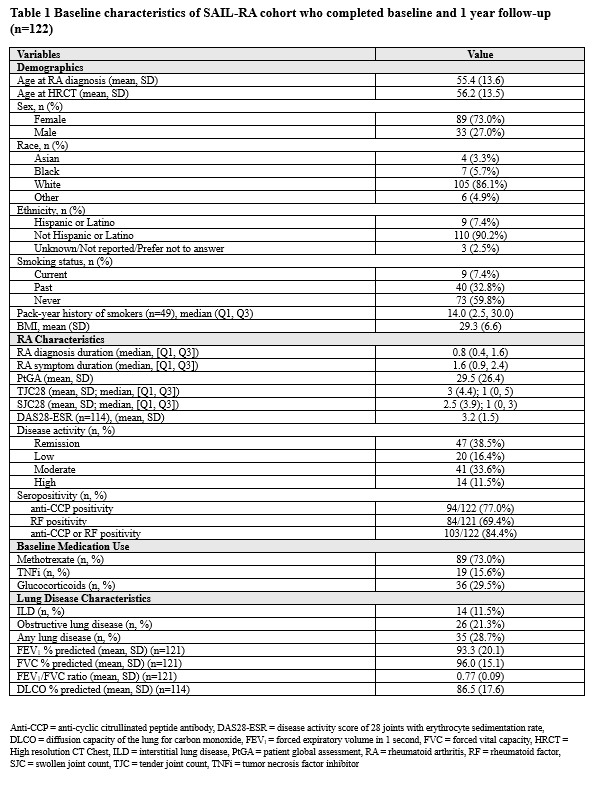Session Information
Date: Tuesday, October 28, 2025
Title: (2227–2264) Rheumatoid Arthritis – Diagnosis, Manifestations, and Outcomes Poster III
Session Type: Poster Session C
Session Time: 10:30AM-12:30PM
Background/Purpose: Several lung diseases are associated with rheumatoid arthritis (RA), including interstitial lung disease (ILD) and emphysema. In RA-ILD baseline lung function and decline in lung function may act as predictors of survival. We aimed to explore change in lung function over 1 year in cohort of participants with early RA.
Methods: SAIL-RA (Study of Inflammatory Arthritis and ILD in Early RA) is a prospective, longitudinal, multicenter study of patients with RA within 2 years of RA diagnosis. Participants were enrolled from 2017 to 2025 at 5 U.S sites. We analyzed participants who completed baseline and 1 year assessments; including baseline high-resolution CT chest (HRCT) as well as pulmonary function tests (PFT) and disease activity assessment (DAS28-ESR) at both visits. We assessed changes in lung function by evaluating mean change in % predicted forced vital capacity (FVC) and diffusion capacity of carbon monoxide (DLCO) from baseline to 1 year using student’s T-test. We categorized participants into 3 groups based on change in PFTs (improved, stable, worsened). ‘Improved’ and ‘worsened’ FVC were defined as an increase or decrease of >5% predicted from baseline to 1 year. ‘Improved’ and ‘worsened’ DLCO were defined as an increase or decrease of >10% predicted from baseline to 1 year. We compared change in lung function based on baseline disease activity and presence/absence of ILD using Chi-square and Fisher’s exact tests. We compared distribution of participants with worsened, stable or improved lung function based on presence/absence of lung disease and continuation/discontinuation of methotrexate (MTX) in baseline MTX users by ANOVA. Low and moderate/high disease activity were defined as DAS28-ESR of <3.2 and >3.3. ILD was defined by radiologists’ interpretation of HRCT. Obstructive lung disease was defined as emphysema on HRCT or FEV1/FVC< 0.7.
Results: 121 participants completed baseline and 1 year assessments with PFTs (Table 1). In the whole cohort approximately half of participants had worsened or improved FVC and/or DLCO at 1 year (Fig 1). The percentage of participants with worsened, stable, or improved FVC was 27.3%, 46,3%, and 26.4%. For DLCO 12.6%, 65%, and 22.3% had worsened, stable, or improved values. In participants with ILD versus no ILD at baseline there was a trend toward worsened FVC % predicted at 1 year in participants with ILD (p=0.089), although mean absolute change in FVC did not differ (2.26% vs 0.16%, p=0.44). There was no difference in the change FVC or DLCO % predicted from baseline to 1 year based on presence or absence of lung disease nor MTX continuation at 1 year (Fig 2). In participants with low versus moderate/high disease activity at baseline there was no difference in distribution of improved, stable or worsened FVC or DLCO at 1 year (p=0.54, p=0.21).
Conclusion: In this prospective cohort of participants with early RA mean change in the FVC and DLCO at a population level was small, although there was significant individual variability over 1 year. While about 20% had worsened FVC or DLCO, most were stable or improved. There was a trend towards a higher proportion of participants with ILD to have worsened FVC compared to those without ILD. MTX use over 1 year was not associated with changes in FVC or DLCO.
To cite this abstract in AMA style:
Mulcaire-Jones E, Huang S, Wang X, Paudel M, Qi Y, Qian G, Getachew L, Kowalski E, Mueller K, Saavedra A, O'Keeffe L, Davis N, Puri A, Vanni K, Bolden C, Mahajan T, Jamali M, Juge P, Doyle T, Bolster M, Deane K, Estepar R, Washko G, McDermott G, England B, Sparks J, Khanna D. Proportion of Early Rheumatoid Arthritis Patients with Improved, Stable, or Worsened Lung Function Over 1-Year: Results from a Multicenter, Prospective Cohort Study [abstract]. Arthritis Rheumatol. 2025; 77 (suppl 9). https://acrabstracts.org/abstract/proportion-of-early-rheumatoid-arthritis-patients-with-improved-stable-or-worsened-lung-function-over-1-year-results-from-a-multicenter-prospective-cohort-study/. Accessed .« Back to ACR Convergence 2025
ACR Meeting Abstracts - https://acrabstracts.org/abstract/proportion-of-early-rheumatoid-arthritis-patients-with-improved-stable-or-worsened-lung-function-over-1-year-results-from-a-multicenter-prospective-cohort-study/


.jpg)
.jpg)